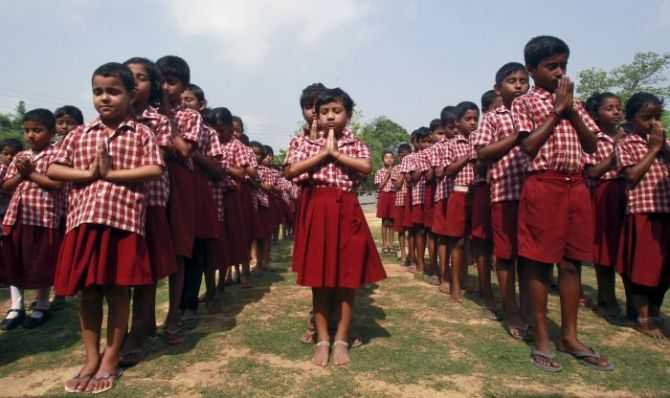Will their teachers be allowed to teach, asks Anjuli Bhargava.

The government primary school at Buddi village in Uttarakhand is more an aberration than the norm.
Run by a highly motivated 56-year-old head teacher, the school has 86 Muslim children across five grades.
It, however, has only four teachers, including the head herself, to teach the five grades.
Not long ago, the school functioned with three teachers but after the recent thrust on Urdu, a new Urdu teacher was allotted to the school, taking their count to four.
Not far away in Bhoodpur village, a single teacher manages a total of 35 students across five grades, leading to a chaotic school day.
The days when she takes a casual leave, the school in Buddi sends one of its teachers to substitute, more as a goodwill gesture than because of any directive.
In yet another primary school in the same cluster -- it has seven in all -- there are two teachers (a head and an assistant teacher) managing a total of 12 students.
In many schools that have few students, teachers spend the day sitting in the sun, eating peanuts and playing cards.
The three primary schools highlight a plight faced in almost every district in the state -- and in many states in India --where poor resource allocation leaves teachers struggling to manage classes along with all the other duties they are required to do.
On the day I am at the school in Buddi, the head teacher is busy with parents who are there for some purpose, one teacher is absent and the other two are trying to manage the 80-odd students present.
The school has no sweepers, no peon or any other ancillary staff.
Students clean toilets and sweep under the direction of the teachers.
A 'bhojan mata' hired for Rs 2,000 a month cooks the midday meal for which the school is reimbursed Rs 4.48 per child per meal.
The meal looks rather unappetising to me -- a watery mix of rice and yellow dal but I observe the children eating eagerly.
Meagre takes on a new perspective when I learn how little the school manages with.
Till very recently, the budget for maintenance and contingencies was Rs 12,000 a year, an amount that has now increased to Rs 25,000 to their delight.
The teachers themselves earn upwards of Rs 50,000 a month with the head teacher drawing a take home of almost Rs 80,000, a mini fortune in the village.
For the first time ever, the school has a fund of Rs 5,000 towards sports. They're planning to add a basketball ring and a net for badminton or volleyball.
The other good news for this particular school is that while it routinely loses students to the private schools in the vicinity, it often gets reverse migrations.
The private schools have better buildings and infrastructure and take students at three years plus.
Parents often don't want to wait till five years to admit their wards and the Buddi school loses students to the private alternatives.
Moreover, the marginally better infrastructure at the private schools attracts parents, especially those with boys as they feel they will get a better deal.
The head teacher, however, proudly introduces me to three boys -- all cases of reverse migrations, that is, those who soon realised the private option wasn't any better.
The parents woke up to the fact that better buildings don't necessarily translate into better learning and they were paying for no additional value.
To stem the outflow from government schools, the head teacher at this school is of the firm view that the government schools must start admitting children from the age of three as no parent is willing to wait till the child is five plus.
Once they have admitted the child in a private school and she is settled, they are reluctant to withdraw even if a government option -- which is free -- is available.
While they admit that many government teachers are not motivated and take the job for granted, the Buddi school head teacher and her team argue that it's unfair to paint everyone with the same brush.
Her teachers are rarely absent.
The three teachers at this school do seem quite motivated and as I watch two of them conduct a class, I observe that they are rather involved with the students.
She and her team argue that delivery outcomes of government schools often suffer as no one is available to do actual teaching.
There are innumerable administrative chores, forms to be filled, norms to be met and guidelines to be followed.
All this accounts for a large percentage of school day and there are days when the actual teaching is limited to just a couple of hours since no one is free from other tasks.
The day I visit the Buddi school, the head teacher is busy helping parents fill forms that entitle them to a Rs 300 a month per child scholarship. Since almost all the parents are illiterate, the task of form filling falls squarely on her.
If it wasn't for the scholarship and the mid-day meal, many of the girls would be withdrawn, she explains. So it's in everyone's interest to get the job done.
This is just one of the endless non-teaching related obligations they are required to fulfill.
As the tasks pile up, often many or sometimes all the teachers are pulled into administrative and other non-teaching duties.
This is the single biggest factor why the performance of students fails to meet expectations.
As I sit and talk to the head, I realise half the battle is won if one has the right attitude.
Despite having very little, she has no complaints barring one. "We don't need teaching aids, training workshops or guidance from NGOs. All we need is to be left free to do what we were hired to do," she says.
In her case, it is also what she really loves to do: Teach!











